Tech Will Save Us: Leadership, Change, and Management Report
VerifiedAdded on 2021/01/03
|9
|2620
|439
Report
AI Summary
This report analyzes leadership and management within the Tech Will Save Us (TWSU) organization, addressing key challenges faced by managers at both domestic and international levels, including developing managerial effectiveness, employee development, team leadership, guiding change, and stakeholder management. It explores various leadership styles, such as autocratic, laissez-faire, transformational, participative, and transactional, assessing their suitability within TWSU. Furthermore, the report examines the skills and knowledge essential for effectively managing change programs, including vision, coalition building, communication, interpersonal skills, motivation, coaching, and technical skills. Finally, it identifies the main causes of resistance to change, such as fear of job loss and poorly aligned reward systems, offering insights into mitigating these challenges.
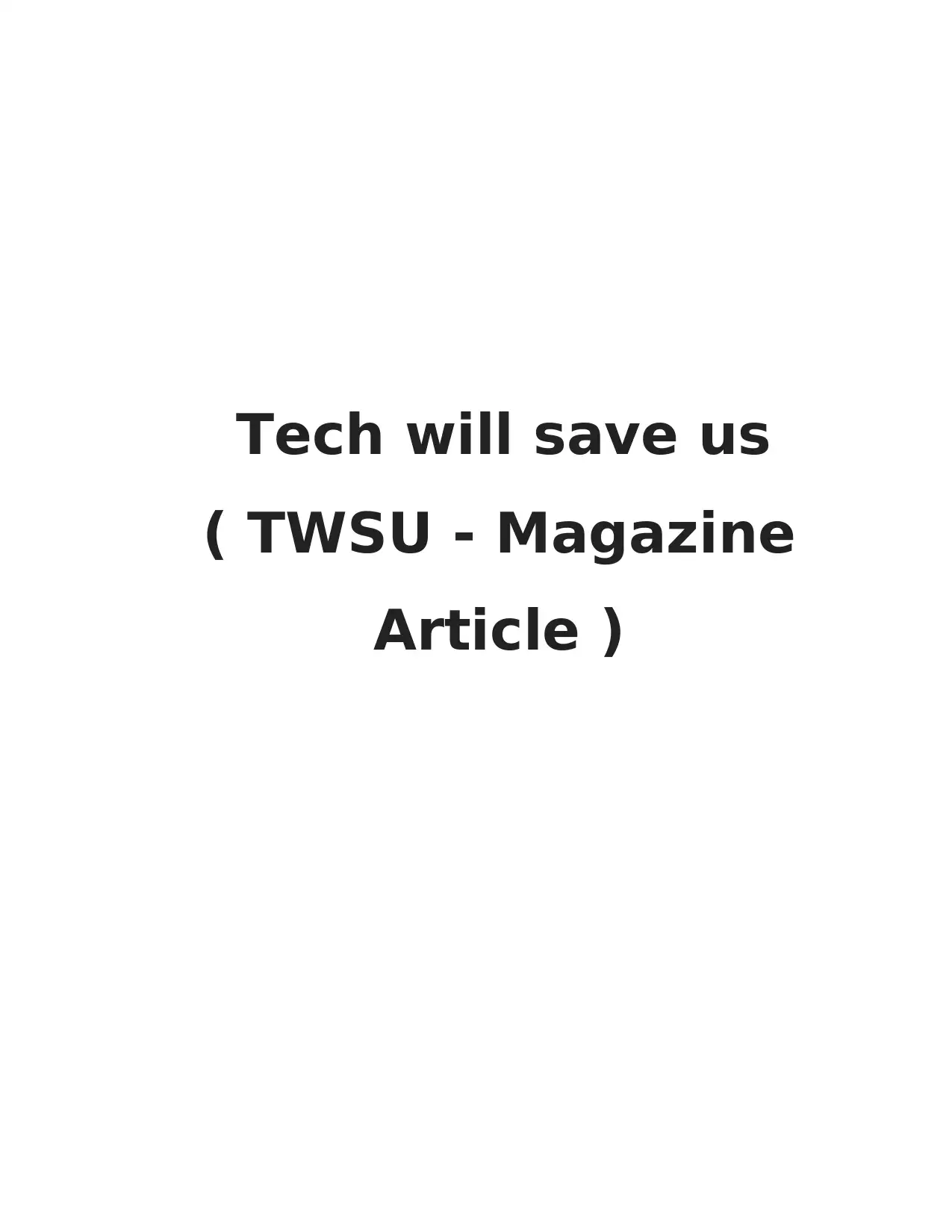
Tech will save us
( TWSU - Magazine
Article )
( TWSU - Magazine
Article )
Paraphrase This Document
Need a fresh take? Get an instant paraphrase of this document with our AI Paraphraser

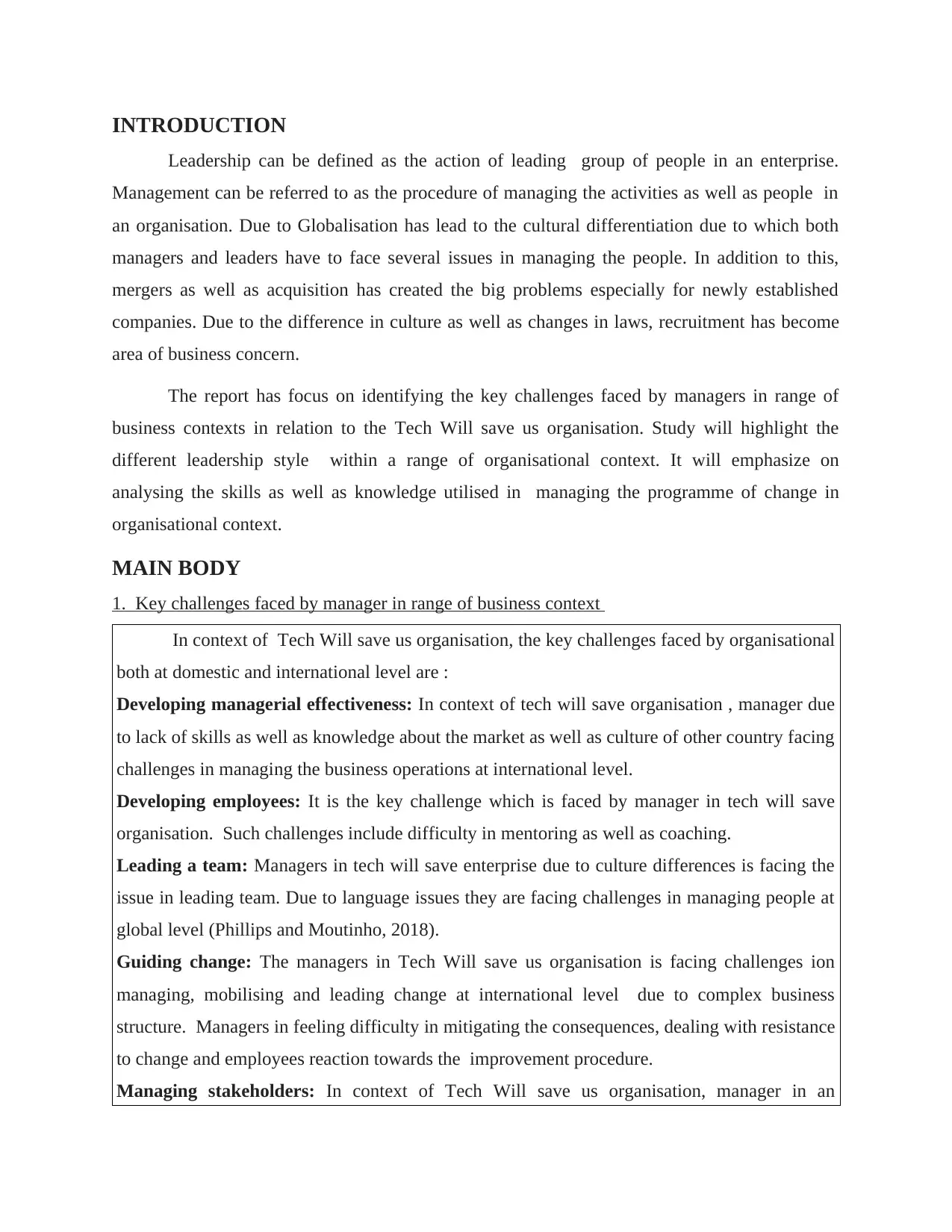
INTRODUCTION
Leadership can be defined as the action of leading group of people in an enterprise.
Management can be referred to as the procedure of managing the activities as well as people in
an organisation. Due to Globalisation has lead to the cultural differentiation due to which both
managers and leaders have to face several issues in managing the people. In addition to this,
mergers as well as acquisition has created the big problems especially for newly established
companies. Due to the difference in culture as well as changes in laws, recruitment has become
area of business concern.
The report has focus on identifying the key challenges faced by managers in range of
business contexts in relation to the Tech Will save us organisation. Study will highlight the
different leadership style within a range of organisational context. It will emphasize on
analysing the skills as well as knowledge utilised in managing the programme of change in
organisational context.
MAIN BODY
1. Key challenges faced by manager in range of business context
In context of Tech Will save us organisation, the key challenges faced by organisational
both at domestic and international level are :
Developing managerial effectiveness: In context of tech will save organisation , manager due
to lack of skills as well as knowledge about the market as well as culture of other country facing
challenges in managing the business operations at international level.
Developing employees: It is the key challenge which is faced by manager in tech will save
organisation. Such challenges include difficulty in mentoring as well as coaching.
Leading a team: Managers in tech will save enterprise due to culture differences is facing the
issue in leading team. Due to language issues they are facing challenges in managing people at
global level (Phillips and Moutinho, 2018).
Guiding change: The managers in Tech Will save us organisation is facing challenges ion
managing, mobilising and leading change at international level due to complex business
structure. Managers in feeling difficulty in mitigating the consequences, dealing with resistance
to change and employees reaction towards the improvement procedure.
Managing stakeholders: In context of Tech Will save us organisation, manager in an
Leadership can be defined as the action of leading group of people in an enterprise.
Management can be referred to as the procedure of managing the activities as well as people in
an organisation. Due to Globalisation has lead to the cultural differentiation due to which both
managers and leaders have to face several issues in managing the people. In addition to this,
mergers as well as acquisition has created the big problems especially for newly established
companies. Due to the difference in culture as well as changes in laws, recruitment has become
area of business concern.
The report has focus on identifying the key challenges faced by managers in range of
business contexts in relation to the Tech Will save us organisation. Study will highlight the
different leadership style within a range of organisational context. It will emphasize on
analysing the skills as well as knowledge utilised in managing the programme of change in
organisational context.
MAIN BODY
1. Key challenges faced by manager in range of business context
In context of Tech Will save us organisation, the key challenges faced by organisational
both at domestic and international level are :
Developing managerial effectiveness: In context of tech will save organisation , manager due
to lack of skills as well as knowledge about the market as well as culture of other country facing
challenges in managing the business operations at international level.
Developing employees: It is the key challenge which is faced by manager in tech will save
organisation. Such challenges include difficulty in mentoring as well as coaching.
Leading a team: Managers in tech will save enterprise due to culture differences is facing the
issue in leading team. Due to language issues they are facing challenges in managing people at
global level (Phillips and Moutinho, 2018).
Guiding change: The managers in Tech Will save us organisation is facing challenges ion
managing, mobilising and leading change at international level due to complex business
structure. Managers in feeling difficulty in mitigating the consequences, dealing with resistance
to change and employees reaction towards the improvement procedure.
Managing stakeholders: In context of Tech Will save us organisation, manager in an
⊘ This is a preview!⊘
Do you want full access?
Subscribe today to unlock all pages.

Trusted by 1+ million students worldwide
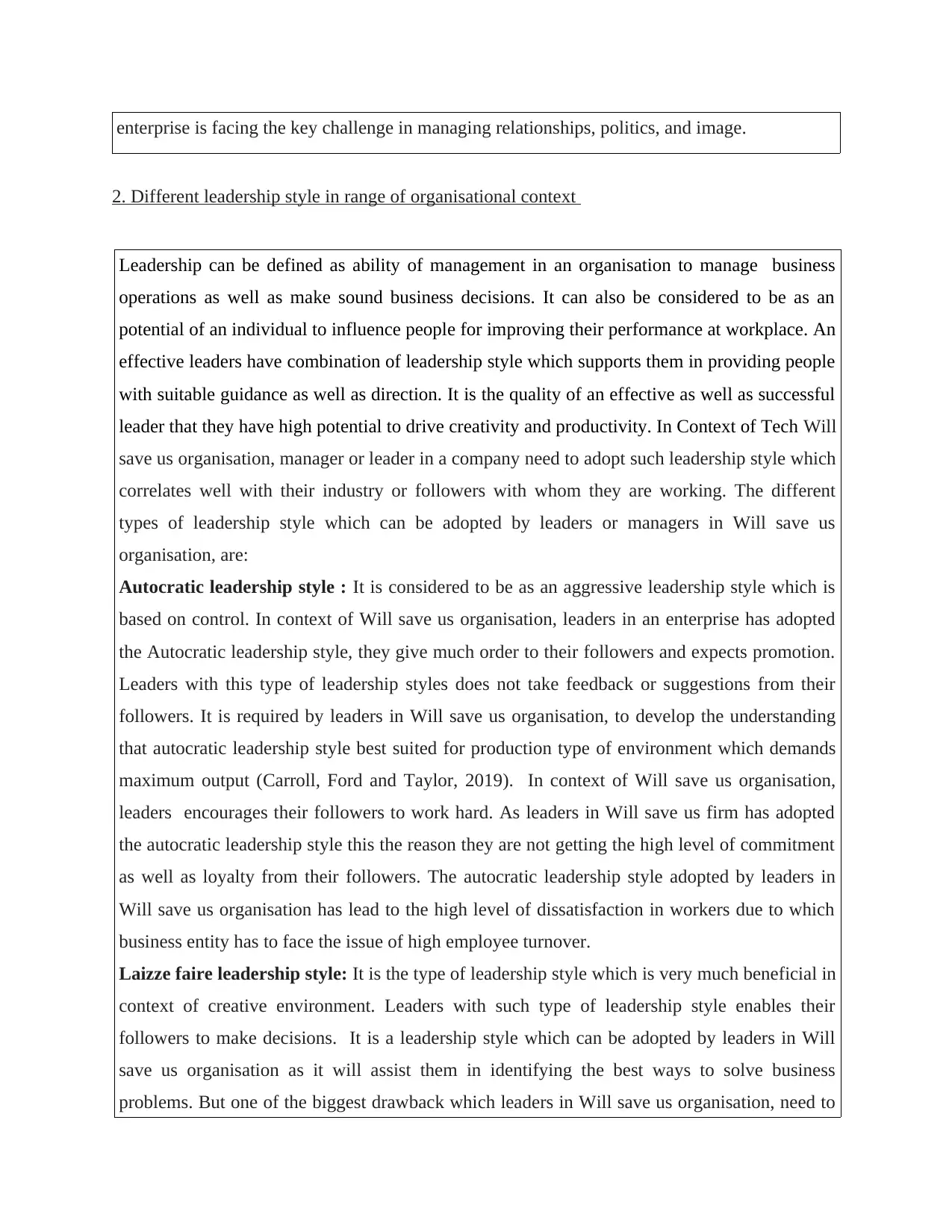
enterprise is facing the key challenge in managing relationships, politics, and image.
2. Different leadership style in range of organisational context
Leadership can be defined as ability of management in an organisation to manage business
operations as well as make sound business decisions. It can also be considered to be as an
potential of an individual to influence people for improving their performance at workplace. An
effective leaders have combination of leadership style which supports them in providing people
with suitable guidance as well as direction. It is the quality of an effective as well as successful
leader that they have high potential to drive creativity and productivity. In Context of Tech Will
save us organisation, manager or leader in a company need to adopt such leadership style which
correlates well with their industry or followers with whom they are working. The different
types of leadership style which can be adopted by leaders or managers in Will save us
organisation, are:
Autocratic leadership style : It is considered to be as an aggressive leadership style which is
based on control. In context of Will save us organisation, leaders in an enterprise has adopted
the Autocratic leadership style, they give much order to their followers and expects promotion.
Leaders with this type of leadership styles does not take feedback or suggestions from their
followers. It is required by leaders in Will save us organisation, to develop the understanding
that autocratic leadership style best suited for production type of environment which demands
maximum output (Carroll, Ford and Taylor, 2019). In context of Will save us organisation,
leaders encourages their followers to work hard. As leaders in Will save us firm has adopted
the autocratic leadership style this the reason they are not getting the high level of commitment
as well as loyalty from their followers. The autocratic leadership style adopted by leaders in
Will save us organisation has lead to the high level of dissatisfaction in workers due to which
business entity has to face the issue of high employee turnover.
Laizze faire leadership style: It is the type of leadership style which is very much beneficial in
context of creative environment. Leaders with such type of leadership style enables their
followers to make decisions. It is a leadership style which can be adopted by leaders in Will
save us organisation as it will assist them in identifying the best ways to solve business
problems. But one of the biggest drawback which leaders in Will save us organisation, need to
2. Different leadership style in range of organisational context
Leadership can be defined as ability of management in an organisation to manage business
operations as well as make sound business decisions. It can also be considered to be as an
potential of an individual to influence people for improving their performance at workplace. An
effective leaders have combination of leadership style which supports them in providing people
with suitable guidance as well as direction. It is the quality of an effective as well as successful
leader that they have high potential to drive creativity and productivity. In Context of Tech Will
save us organisation, manager or leader in a company need to adopt such leadership style which
correlates well with their industry or followers with whom they are working. The different
types of leadership style which can be adopted by leaders or managers in Will save us
organisation, are:
Autocratic leadership style : It is considered to be as an aggressive leadership style which is
based on control. In context of Will save us organisation, leaders in an enterprise has adopted
the Autocratic leadership style, they give much order to their followers and expects promotion.
Leaders with this type of leadership styles does not take feedback or suggestions from their
followers. It is required by leaders in Will save us organisation, to develop the understanding
that autocratic leadership style best suited for production type of environment which demands
maximum output (Carroll, Ford and Taylor, 2019). In context of Will save us organisation,
leaders encourages their followers to work hard. As leaders in Will save us firm has adopted
the autocratic leadership style this the reason they are not getting the high level of commitment
as well as loyalty from their followers. The autocratic leadership style adopted by leaders in
Will save us organisation has lead to the high level of dissatisfaction in workers due to which
business entity has to face the issue of high employee turnover.
Laizze faire leadership style: It is the type of leadership style which is very much beneficial in
context of creative environment. Leaders with such type of leadership style enables their
followers to make decisions. It is a leadership style which can be adopted by leaders in Will
save us organisation as it will assist them in identifying the best ways to solve business
problems. But one of the biggest drawback which leaders in Will save us organisation, need to
Paraphrase This Document
Need a fresh take? Get an instant paraphrase of this document with our AI Paraphraser
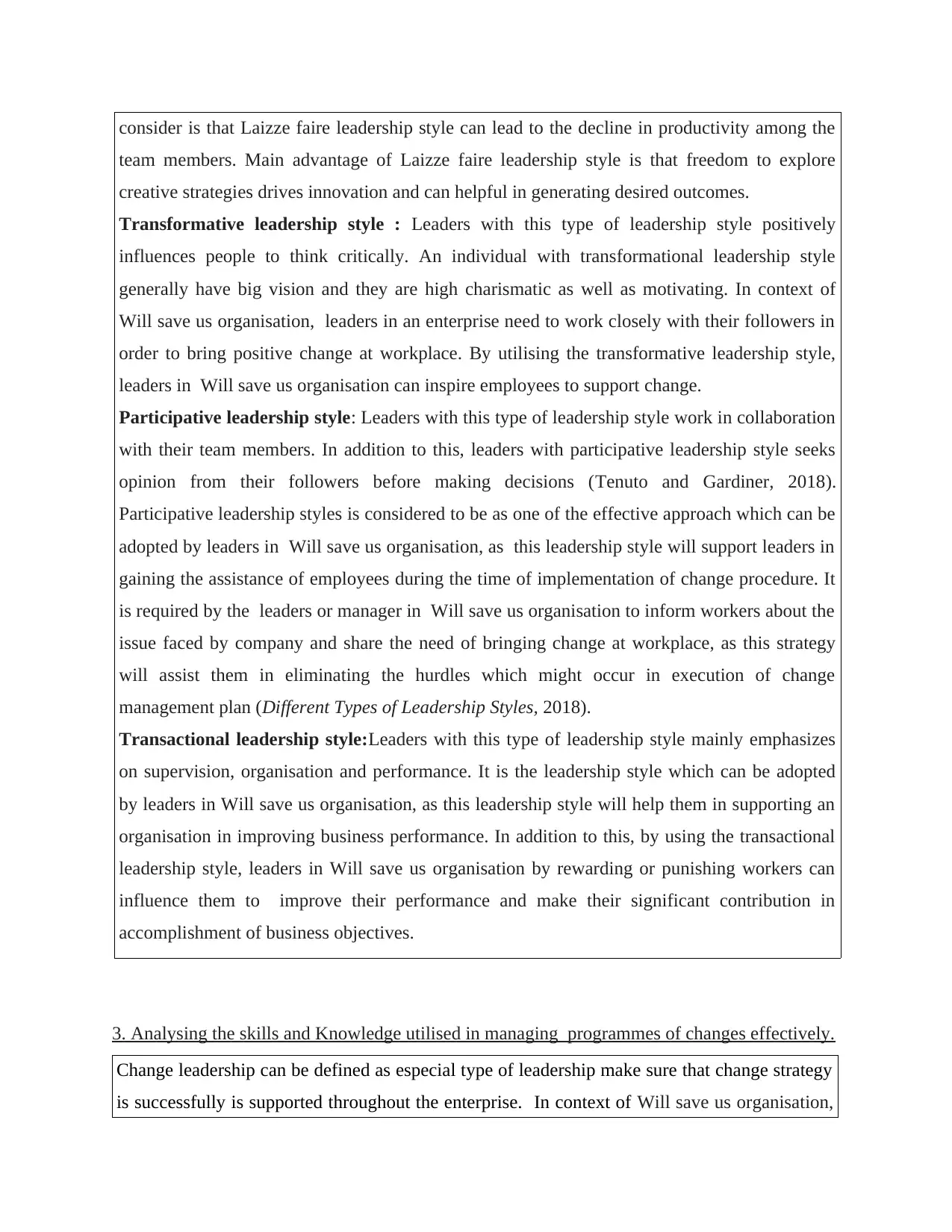
consider is that Laizze faire leadership style can lead to the decline in productivity among the
team members. Main advantage of Laizze faire leadership style is that freedom to explore
creative strategies drives innovation and can helpful in generating desired outcomes.
Transformative leadership style : Leaders with this type of leadership style positively
influences people to think critically. An individual with transformational leadership style
generally have big vision and they are high charismatic as well as motivating. In context of
Will save us organisation, leaders in an enterprise need to work closely with their followers in
order to bring positive change at workplace. By utilising the transformative leadership style,
leaders in Will save us organisation can inspire employees to support change.
Participative leadership style: Leaders with this type of leadership style work in collaboration
with their team members. In addition to this, leaders with participative leadership style seeks
opinion from their followers before making decisions (Tenuto and Gardiner, 2018).
Participative leadership styles is considered to be as one of the effective approach which can be
adopted by leaders in Will save us organisation, as this leadership style will support leaders in
gaining the assistance of employees during the time of implementation of change procedure. It
is required by the leaders or manager in Will save us organisation to inform workers about the
issue faced by company and share the need of bringing change at workplace, as this strategy
will assist them in eliminating the hurdles which might occur in execution of change
management plan (Different Types of Leadership Styles, 2018).
Transactional leadership style:Leaders with this type of leadership style mainly emphasizes
on supervision, organisation and performance. It is the leadership style which can be adopted
by leaders in Will save us organisation, as this leadership style will help them in supporting an
organisation in improving business performance. In addition to this, by using the transactional
leadership style, leaders in Will save us organisation by rewarding or punishing workers can
influence them to improve their performance and make their significant contribution in
accomplishment of business objectives.
3. Analysing the skills and Knowledge utilised in managing programmes of changes effectively.
Change leadership can be defined as especial type of leadership make sure that change strategy
is successfully is supported throughout the enterprise. In context of Will save us organisation,
team members. Main advantage of Laizze faire leadership style is that freedom to explore
creative strategies drives innovation and can helpful in generating desired outcomes.
Transformative leadership style : Leaders with this type of leadership style positively
influences people to think critically. An individual with transformational leadership style
generally have big vision and they are high charismatic as well as motivating. In context of
Will save us organisation, leaders in an enterprise need to work closely with their followers in
order to bring positive change at workplace. By utilising the transformative leadership style,
leaders in Will save us organisation can inspire employees to support change.
Participative leadership style: Leaders with this type of leadership style work in collaboration
with their team members. In addition to this, leaders with participative leadership style seeks
opinion from their followers before making decisions (Tenuto and Gardiner, 2018).
Participative leadership styles is considered to be as one of the effective approach which can be
adopted by leaders in Will save us organisation, as this leadership style will support leaders in
gaining the assistance of employees during the time of implementation of change procedure. It
is required by the leaders or manager in Will save us organisation to inform workers about the
issue faced by company and share the need of bringing change at workplace, as this strategy
will assist them in eliminating the hurdles which might occur in execution of change
management plan (Different Types of Leadership Styles, 2018).
Transactional leadership style:Leaders with this type of leadership style mainly emphasizes
on supervision, organisation and performance. It is the leadership style which can be adopted
by leaders in Will save us organisation, as this leadership style will help them in supporting an
organisation in improving business performance. In addition to this, by using the transactional
leadership style, leaders in Will save us organisation by rewarding or punishing workers can
influence them to improve their performance and make their significant contribution in
accomplishment of business objectives.
3. Analysing the skills and Knowledge utilised in managing programmes of changes effectively.
Change leadership can be defined as especial type of leadership make sure that change strategy
is successfully is supported throughout the enterprise. In context of Will save us organisation,
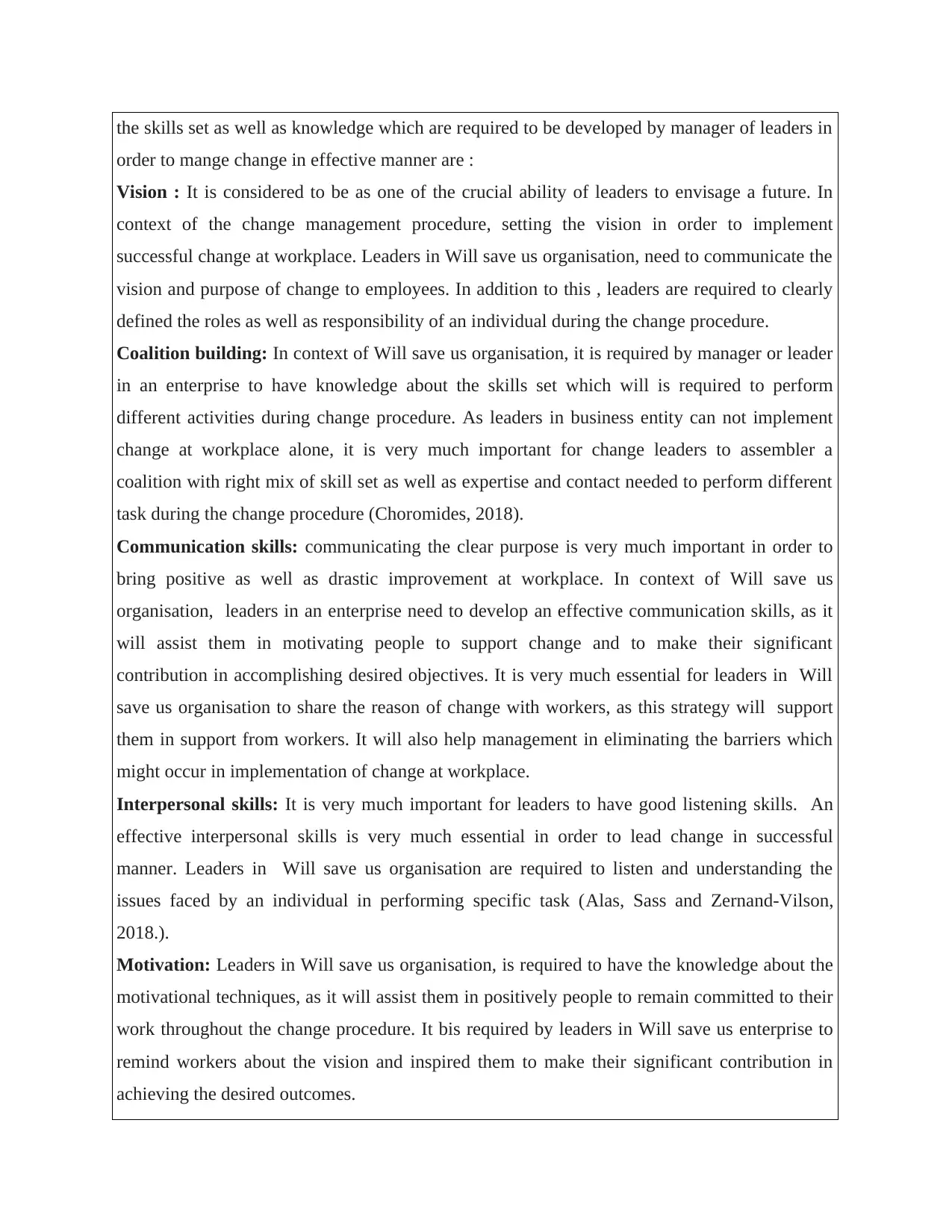
the skills set as well as knowledge which are required to be developed by manager of leaders in
order to mange change in effective manner are :
Vision : It is considered to be as one of the crucial ability of leaders to envisage a future. In
context of the change management procedure, setting the vision in order to implement
successful change at workplace. Leaders in Will save us organisation, need to communicate the
vision and purpose of change to employees. In addition to this , leaders are required to clearly
defined the roles as well as responsibility of an individual during the change procedure.
Coalition building: In context of Will save us organisation, it is required by manager or leader
in an enterprise to have knowledge about the skills set which will is required to perform
different activities during change procedure. As leaders in business entity can not implement
change at workplace alone, it is very much important for change leaders to assembler a
coalition with right mix of skill set as well as expertise and contact needed to perform different
task during the change procedure (Choromides, 2018).
Communication skills: communicating the clear purpose is very much important in order to
bring positive as well as drastic improvement at workplace. In context of Will save us
organisation, leaders in an enterprise need to develop an effective communication skills, as it
will assist them in motivating people to support change and to make their significant
contribution in accomplishing desired objectives. It is very much essential for leaders in Will
save us organisation to share the reason of change with workers, as this strategy will support
them in support from workers. It will also help management in eliminating the barriers which
might occur in implementation of change at workplace.
Interpersonal skills: It is very much important for leaders to have good listening skills. An
effective interpersonal skills is very much essential in order to lead change in successful
manner. Leaders in Will save us organisation are required to listen and understanding the
issues faced by an individual in performing specific task (Alas, Sass and Zernand-Vilson,
2018.).
Motivation: Leaders in Will save us organisation, is required to have the knowledge about the
motivational techniques, as it will assist them in positively people to remain committed to their
work throughout the change procedure. It bis required by leaders in Will save us enterprise to
remind workers about the vision and inspired them to make their significant contribution in
achieving the desired outcomes.
order to mange change in effective manner are :
Vision : It is considered to be as one of the crucial ability of leaders to envisage a future. In
context of the change management procedure, setting the vision in order to implement
successful change at workplace. Leaders in Will save us organisation, need to communicate the
vision and purpose of change to employees. In addition to this , leaders are required to clearly
defined the roles as well as responsibility of an individual during the change procedure.
Coalition building: In context of Will save us organisation, it is required by manager or leader
in an enterprise to have knowledge about the skills set which will is required to perform
different activities during change procedure. As leaders in business entity can not implement
change at workplace alone, it is very much important for change leaders to assembler a
coalition with right mix of skill set as well as expertise and contact needed to perform different
task during the change procedure (Choromides, 2018).
Communication skills: communicating the clear purpose is very much important in order to
bring positive as well as drastic improvement at workplace. In context of Will save us
organisation, leaders in an enterprise need to develop an effective communication skills, as it
will assist them in motivating people to support change and to make their significant
contribution in accomplishing desired objectives. It is very much essential for leaders in Will
save us organisation to share the reason of change with workers, as this strategy will support
them in support from workers. It will also help management in eliminating the barriers which
might occur in implementation of change at workplace.
Interpersonal skills: It is very much important for leaders to have good listening skills. An
effective interpersonal skills is very much essential in order to lead change in successful
manner. Leaders in Will save us organisation are required to listen and understanding the
issues faced by an individual in performing specific task (Alas, Sass and Zernand-Vilson,
2018.).
Motivation: Leaders in Will save us organisation, is required to have the knowledge about the
motivational techniques, as it will assist them in positively people to remain committed to their
work throughout the change procedure. It bis required by leaders in Will save us enterprise to
remind workers about the vision and inspired them to make their significant contribution in
achieving the desired outcomes.
⊘ This is a preview!⊘
Do you want full access?
Subscribe today to unlock all pages.

Trusted by 1+ million students worldwide
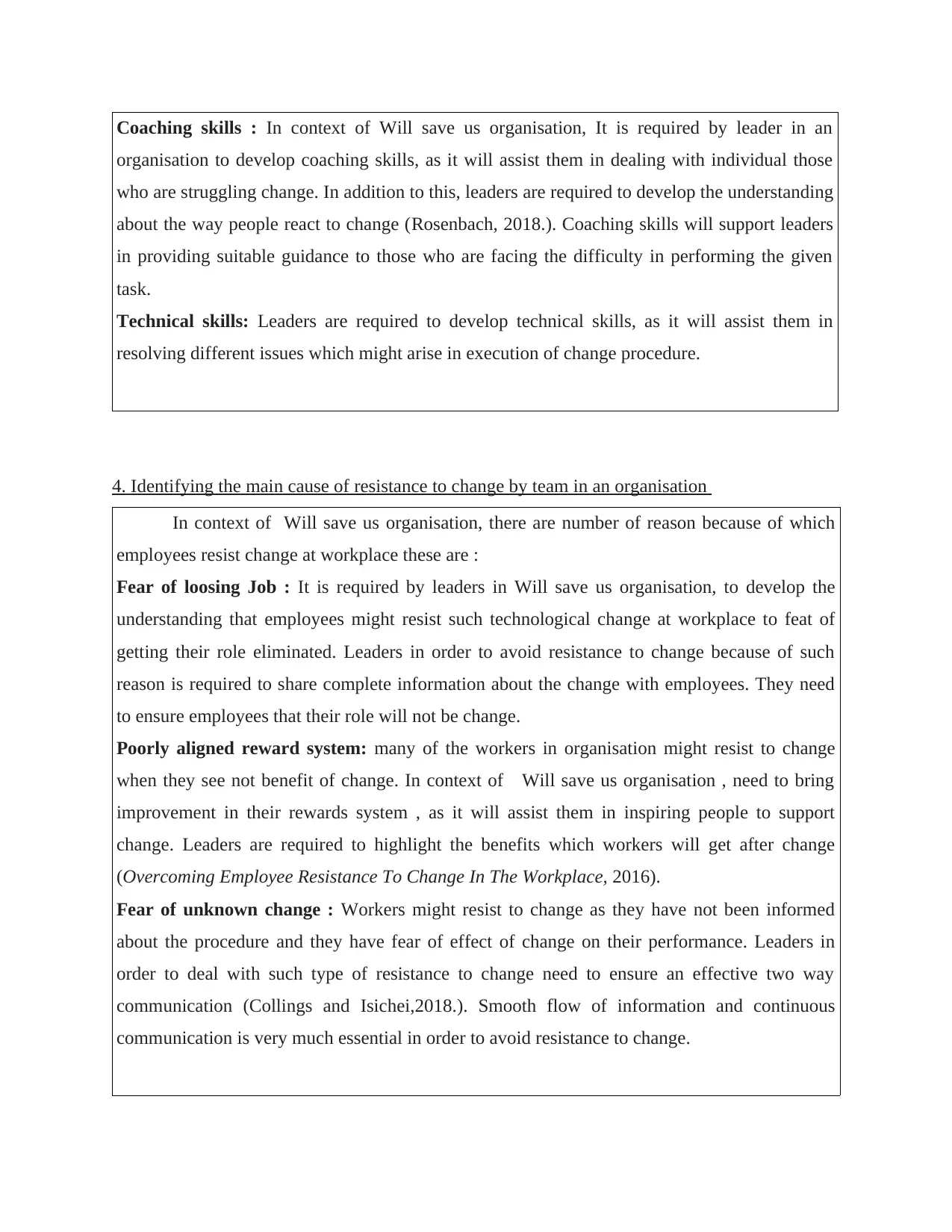
Coaching skills : In context of Will save us organisation, It is required by leader in an
organisation to develop coaching skills, as it will assist them in dealing with individual those
who are struggling change. In addition to this, leaders are required to develop the understanding
about the way people react to change (Rosenbach, 2018.). Coaching skills will support leaders
in providing suitable guidance to those who are facing the difficulty in performing the given
task.
Technical skills: Leaders are required to develop technical skills, as it will assist them in
resolving different issues which might arise in execution of change procedure.
4. Identifying the main cause of resistance to change by team in an organisation
In context of Will save us organisation, there are number of reason because of which
employees resist change at workplace these are :
Fear of loosing Job : It is required by leaders in Will save us organisation, to develop the
understanding that employees might resist such technological change at workplace to feat of
getting their role eliminated. Leaders in order to avoid resistance to change because of such
reason is required to share complete information about the change with employees. They need
to ensure employees that their role will not be change.
Poorly aligned reward system: many of the workers in organisation might resist to change
when they see not benefit of change. In context of Will save us organisation , need to bring
improvement in their rewards system , as it will assist them in inspiring people to support
change. Leaders are required to highlight the benefits which workers will get after change
(Overcoming Employee Resistance To Change In The Workplace, 2016).
Fear of unknown change : Workers might resist to change as they have not been informed
about the procedure and they have fear of effect of change on their performance. Leaders in
order to deal with such type of resistance to change need to ensure an effective two way
communication (Collings and Isichei,2018.). Smooth flow of information and continuous
communication is very much essential in order to avoid resistance to change.
organisation to develop coaching skills, as it will assist them in dealing with individual those
who are struggling change. In addition to this, leaders are required to develop the understanding
about the way people react to change (Rosenbach, 2018.). Coaching skills will support leaders
in providing suitable guidance to those who are facing the difficulty in performing the given
task.
Technical skills: Leaders are required to develop technical skills, as it will assist them in
resolving different issues which might arise in execution of change procedure.
4. Identifying the main cause of resistance to change by team in an organisation
In context of Will save us organisation, there are number of reason because of which
employees resist change at workplace these are :
Fear of loosing Job : It is required by leaders in Will save us organisation, to develop the
understanding that employees might resist such technological change at workplace to feat of
getting their role eliminated. Leaders in order to avoid resistance to change because of such
reason is required to share complete information about the change with employees. They need
to ensure employees that their role will not be change.
Poorly aligned reward system: many of the workers in organisation might resist to change
when they see not benefit of change. In context of Will save us organisation , need to bring
improvement in their rewards system , as it will assist them in inspiring people to support
change. Leaders are required to highlight the benefits which workers will get after change
(Overcoming Employee Resistance To Change In The Workplace, 2016).
Fear of unknown change : Workers might resist to change as they have not been informed
about the procedure and they have fear of effect of change on their performance. Leaders in
order to deal with such type of resistance to change need to ensure an effective two way
communication (Collings and Isichei,2018.). Smooth flow of information and continuous
communication is very much essential in order to avoid resistance to change.
Paraphrase This Document
Need a fresh take? Get an instant paraphrase of this document with our AI Paraphraser
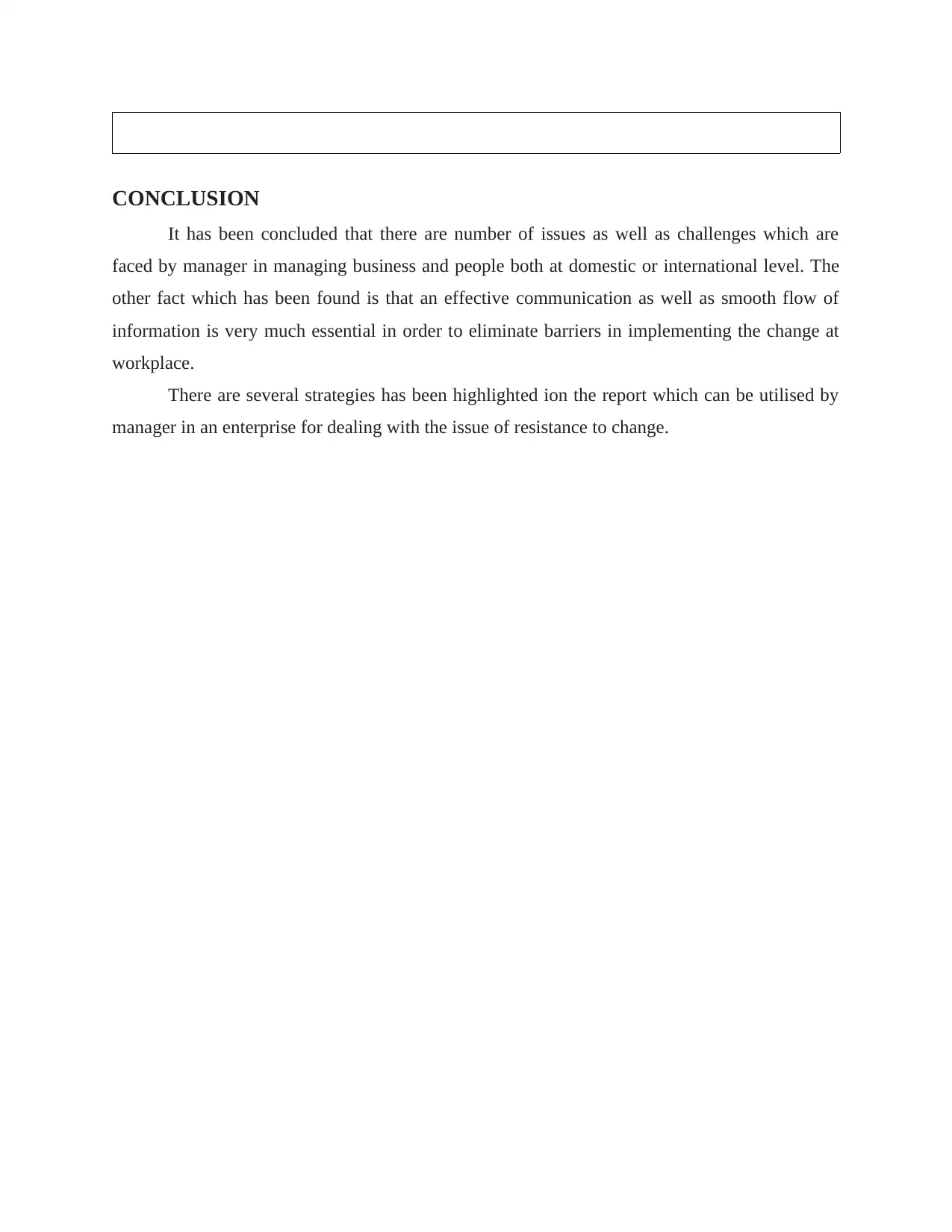
CONCLUSION
It has been concluded that there are number of issues as well as challenges which are
faced by manager in managing business and people both at domestic or international level. The
other fact which has been found is that an effective communication as well as smooth flow of
information is very much essential in order to eliminate barriers in implementing the change at
workplace.
There are several strategies has been highlighted ion the report which can be utilised by
manager in an enterprise for dealing with the issue of resistance to change.
It has been concluded that there are number of issues as well as challenges which are
faced by manager in managing business and people both at domestic or international level. The
other fact which has been found is that an effective communication as well as smooth flow of
information is very much essential in order to eliminate barriers in implementing the change at
workplace.
There are several strategies has been highlighted ion the report which can be utilised by
manager in an enterprise for dealing with the issue of resistance to change.
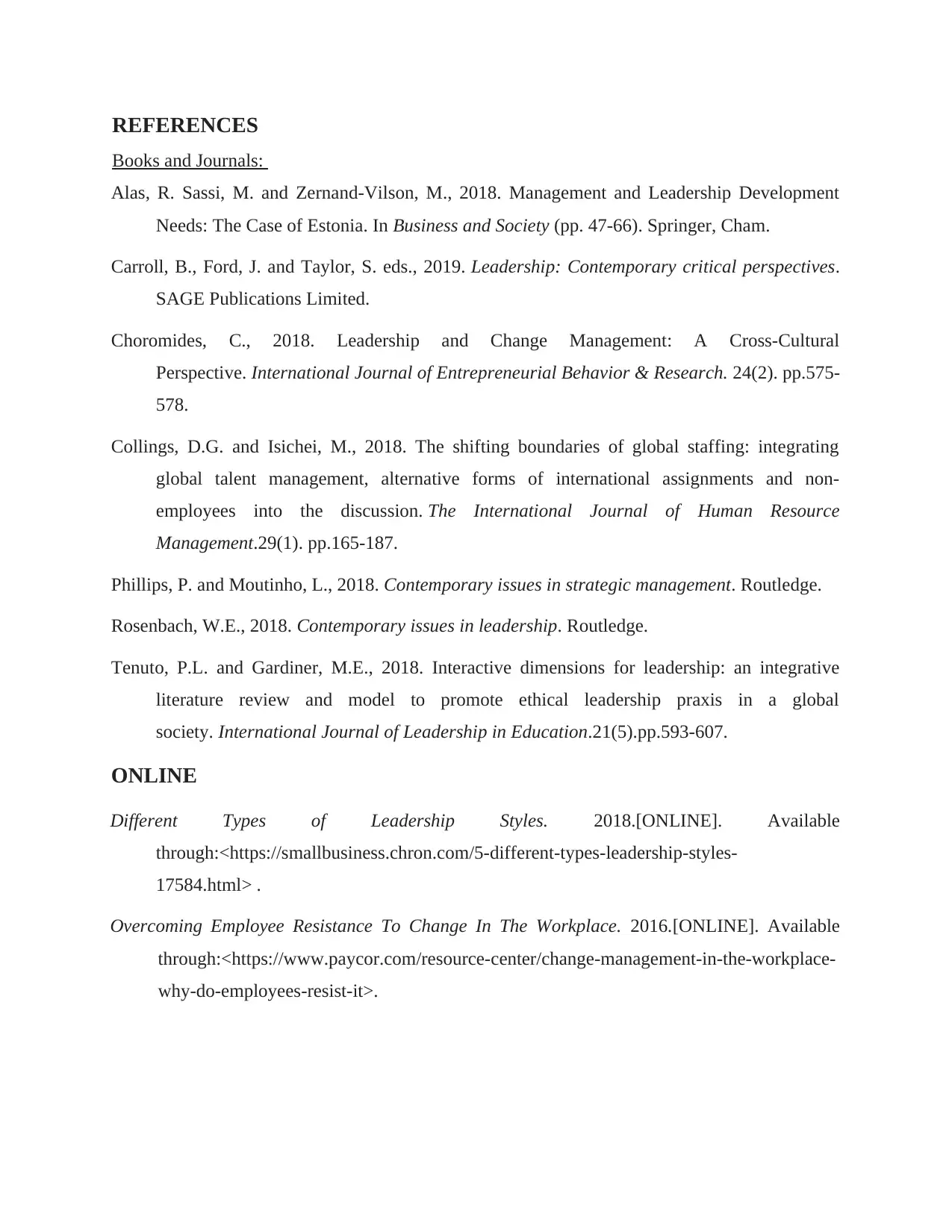
REFERENCES
Books and Journals:
Alas, R. Sassi, M. and Zernand-Vilson, M., 2018. Management and Leadership Development
Needs: The Case of Estonia. In Business and Society (pp. 47-66). Springer, Cham.
Carroll, B., Ford, J. and Taylor, S. eds., 2019. Leadership: Contemporary critical perspectives.
SAGE Publications Limited.
Choromides, C., 2018. Leadership and Change Management: A Cross-Cultural
Perspective. International Journal of Entrepreneurial Behavior & Research. 24(2). pp.575-
578.
Collings, D.G. and Isichei, M., 2018. The shifting boundaries of global staffing: integrating
global talent management, alternative forms of international assignments and non-
employees into the discussion. The International Journal of Human Resource
Management.29(1). pp.165-187.
Phillips, P. and Moutinho, L., 2018. Contemporary issues in strategic management. Routledge.
Rosenbach, W.E., 2018. Contemporary issues in leadership. Routledge.
Tenuto, P.L. and Gardiner, M.E., 2018. Interactive dimensions for leadership: an integrative
literature review and model to promote ethical leadership praxis in a global
society. International Journal of Leadership in Education.21(5).pp.593-607.
ONLINE
Different Types of Leadership Styles. 2018.[ONLINE]. Available
through:<https://smallbusiness.chron.com/5-different-types-leadership-styles-
17584.html> .
Overcoming Employee Resistance To Change In The Workplace. 2016.[ONLINE]. Available
through:<https://www.paycor.com/resource-center/change-management-in-the-workplace-
why-do-employees-resist-it>.
Books and Journals:
Alas, R. Sassi, M. and Zernand-Vilson, M., 2018. Management and Leadership Development
Needs: The Case of Estonia. In Business and Society (pp. 47-66). Springer, Cham.
Carroll, B., Ford, J. and Taylor, S. eds., 2019. Leadership: Contemporary critical perspectives.
SAGE Publications Limited.
Choromides, C., 2018. Leadership and Change Management: A Cross-Cultural
Perspective. International Journal of Entrepreneurial Behavior & Research. 24(2). pp.575-
578.
Collings, D.G. and Isichei, M., 2018. The shifting boundaries of global staffing: integrating
global talent management, alternative forms of international assignments and non-
employees into the discussion. The International Journal of Human Resource
Management.29(1). pp.165-187.
Phillips, P. and Moutinho, L., 2018. Contemporary issues in strategic management. Routledge.
Rosenbach, W.E., 2018. Contemporary issues in leadership. Routledge.
Tenuto, P.L. and Gardiner, M.E., 2018. Interactive dimensions for leadership: an integrative
literature review and model to promote ethical leadership praxis in a global
society. International Journal of Leadership in Education.21(5).pp.593-607.
ONLINE
Different Types of Leadership Styles. 2018.[ONLINE]. Available
through:<https://smallbusiness.chron.com/5-different-types-leadership-styles-
17584.html> .
Overcoming Employee Resistance To Change In The Workplace. 2016.[ONLINE]. Available
through:<https://www.paycor.com/resource-center/change-management-in-the-workplace-
why-do-employees-resist-it>.
⊘ This is a preview!⊘
Do you want full access?
Subscribe today to unlock all pages.

Trusted by 1+ million students worldwide
1 out of 9
Related Documents
Your All-in-One AI-Powered Toolkit for Academic Success.
+13062052269
info@desklib.com
Available 24*7 on WhatsApp / Email
![[object Object]](/_next/static/media/star-bottom.7253800d.svg)
Unlock your academic potential
Copyright © 2020–2025 A2Z Services. All Rights Reserved. Developed and managed by ZUCOL.





